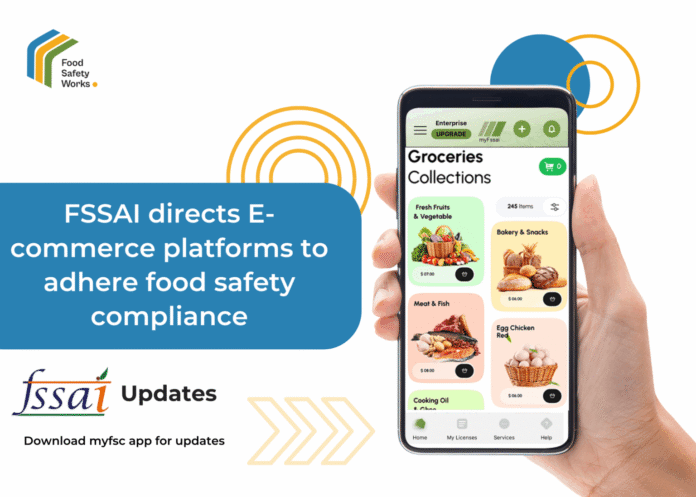
In a major regulatory move, the Food Safety and Standards Authority of India (FSSAI) has introduced norms to reinforce food hygiene, ensure supply chain transparency, and improve regulatory accountability across online and food delivery and eCommerce platforms.
The regulator said that these new directives, issued during a high-level meeting on 8 July, 2025, in New Delhi, are a step to regulate India’s fast-growing eCommerce food sector.
Over 70 stakeholders from leading food aggregators and e-commerce companies attended the meeting, where the FSSAI CEO outlined critical action points. “The move reflects the authority’s intensified focus on ensuring that food safety standards in digital commerce match those required in traditional food retail,” FSSAI stated in a post.
The FSSAI directives center around greater visibility, training, hygiene, and compliance reporting for all eCcommerce food manufacturers and platforms.
Mandatory display of FSSAI license/registration: To enhance traceability and consumer confidence, all eCommerce food platforms have been told to display their FSSAI license or registration number on transaction documents such as invoices, memos, and digital receipts provided to consumers in a clear manner.
Visibility of food safety connect app: Information about the Food Safety Connect App have to be made accessible to users, FSSAI says. The mobile application enables consumers to lodge complaints and access verified food safety data, making the process more transparent and user-centric.
Warehouse and storage compliance: Platforms have been told to upload updated details of their storage and warehousing facilities on the FoSCoS (Food Safety and Compliance System) portal. These include photographs and structural information, ensuring that all backend operations meet hygiene and regulatory standards. FSSAI is also exploring the possibility of mandating expiry date disclosures for packaged food at the point of sale.
FoSTaC training for food handlers: All personnel handling food in the eCommerce supply chain are mandated to complete FoSTaC (Food Safety Training and Certification). Platforms should maintain documentation of these sessions and submit them to FSSAI as part of regular audits.
Critical for eCommerce manufacturers
As India’s food industry increasingly moves online, the risks of unregulated storage, inconsistent hygiene, and non-transparent delivery systems also emerge. FSSAI says its eCommerce norms are designed to bring uniformity and accountability across the supply chain, especially for eCommerce food manufacturers and sellers.
The new rules address gaps that could compromise consumer health, the regulator says. “They will ensure digital sellers obey the same standards as traditional food businesses, bring transparency to food origin, storage, and handling; and create clear responsibilities for all entities in the food value chain.”
With this directive, FSSAI has made it clear that the online food economy cannot remain outside the purview of strict food safety compliance. By enforcing hygiene protocols, data transparency, and licensing requirements, FSSAI says it is bridging the regulatory gap between digital and traditional food ecosystems.
IndiFoodBev — authentic, impactful and influential
An English-language food and beverage processing and packaging industry B2B platform in print and web, IndiFoodBev is in its third year of publication. It is said that the Indian food and beverage industries represent approximately US$ 900 billion in revenues which implies more than 20% of the country’s GDP. Eliminating the wastage on the farmside can help to deliver more protein to a higher number of the population apart from generating sizable exports. The savings in soil, seeds, water, fertilizer, energy and ultimately food and nutrition could be the most immense contribution that country is poised to make to the moderation of climate change.
To improve your marketing and grow sales to the food and beverage processing and packaging industry, talk to us. Our research and consulting company IppStar [www.ippstar.org] can assess your potential and addressable markets in light of the competition. We can discuss marketing, communication, and sales strategies for market entry and growth.
Suppliers and service providers with a strategy and budget for targeted marketing can discuss using our hybrid print, web, video, and social media channels to create brand recognition linked to market relevance. Our technical writers are ready to meet you and your customers for content.
The second largest producer of fruit and vegetables in the world is continuously expanding processing capacities and delivery systems with appropriate innovative technologies. We cover product and consumer trends, nutrition, processing, research, equipment and packaging from farm to thali. Get our 2025 media kit and recalibrate your role in this dynamic market. Enhance your visibility and relevance to existing markets and turn potential customers into conversations. Ask for a sample copy of our bi-monthly in print or our weekly IndiFoodBev eZine each Wednesday.
For editorial info@ippgroup.in — for advertisement ads1@ippgroup.in and for subscriptions subscription@ippgroup.in
Naresh Khanna – 10 February 2025
Subscribe Now










